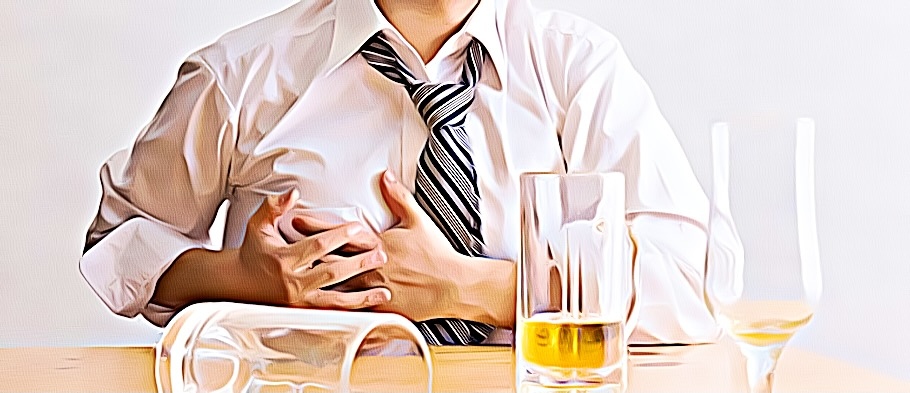Many people will drink alcohol at parties, at restaurants, or at social gatherings as a way to relax, bond with friends and family, celebrate a special occasion, or even just to have fun. However, drinking too much alcohol often leads to a host of serious side effects.
Other than the usual negative ramifications of drinking, such as ills like blackouts, hangovers, and stomachaches, heavy drinking can also cause unexpected discomfort like chest pains.
You don’t need to be an alcoholic to feel these effects, so if you’ve experienced a sudden, tightening feeling in your chest after drinking, you’re not alone.
What Does It Mean If You Have Chest Pains After Drinking Alcohol?
Drinking can cause chest pains for several reasons. While you’re drinking, the alcohol acts as a diuretic, flushing water and other fluids out of your body. When this happens, your body is deprived of fluids, which causes your body to signal you to drink more.
Because your body is dehydrated, it becomes more difficult for your heart to pump blood around to your organs and muscles. This can affect your heart rate and blood pressure, which is why it’s important to drink plenty of water while you’re drinking.
Is It Normal to Have Chest Pains After Drinking Alcohol?
Feelings of discomfort in your chest after drinking isn’t necessarily a normal occurrence, so it’s important to consult with your doctor if you start to get chest pains. This is especially true if you experience this every time you drink, because while it is customary for many people to experience chest pain from alcohol consumption, more serious causes may be present.
Alcohol-related chest pain isn’t always a cause for concern, but it can also be a symptom of a serious underlying condition. In some cases, even a single instance of chest pain after drinking can be indicative of a more serious problem.
Chest Pains: Don’t Confuse It With a Heart Attack!
The good news is that you needn’t worry that you’re having a heart attack when you experience chest pains after drinking. Although heart-related problems are possible, most of the time these pains are caused by other factors.
Chest pain after drinking can occur with any amount of alcohol. It also doesn’t discriminate between men and women. Heart problems, however, rarely occur with a small amount of alcohol. Unless you have a history of heart disease, or regularly drink excessive amounts of alcohol, it’s unlikely that chest pain after drinking is caused by a heart problem.
How Does Alcohol Affect the Heart?
Alcohol can cause short-term side effects like increased heart rate, increased blood pressure, and dehydration. These are risks that many people are okay to take, knowing that these effects will only last for a short period of time.
Drinking too much alcohol over a long period of time, however, can cause long-term effects on the heart. These include an increased risk of heart disease, irregular heartbeat, and can even lead to a heart attack or death.
This is because alcohol also dilates your blood vessels, which allows more oxygenated blood to enter your heart. This can cause your heart rate and blood pressure to increase, which is why it’s important to drink less alcohol if you’re taking medications for a heart condition.
Alcohol also affects your blood sodium levels, which is an electrolyte that helps your blood cells move and helps your blood vessels contract.
In addition, alcohol causes sodium levels to drop, which can lead to a condition known as hyponatremia, which causes your heart to beat erratically and can lead to a heart attack or stroke. These issues can occur even if you’re drinking at low to moderate levels.
Last but certainly not least, too much alcohol can cause high blood pressure, which is a common cause of chest pain. High blood pressure is also a major risk factor for heart attacks.
Alcohol and Heart Attacks: How to Differentiate from Chest Pains
While chest pains can certainly be triggered by alcohol, they can also be a sign of something more serious. So if you experience chest pain after drinking, it’s important to understand how to differentiate between a heart attack and chest pains caused by alcohol.
Chest pains caused by alcohol are likely to occur while you’re drinking, or even after you’re finished drinking. Chest pains caused by a heart attack, however, come on suddenly and can occur at any time.
Here are the key symptoms to watch out for when assessing whether your chest pains are actually caused by a heart attack:
- A crushing, tight pain on the chest that moves to either the jaw or left side of the body;
- Upper jaw, neck, back, or arm pain;
- Difficulty breathing;
- Nausea;
- Tiredness;
- Weakness;
- Loss of consciousness;
- Anxiety;
Who is Susceptible to Experience Chest Pains When Drinking?
Who is susceptible to chest pains after drinking? Anyone can experience chest pains after drinking, but there are some people who have a higher risk.
For people who have a history of heart disease, heavy alcohol consumption increases the risk of heart disease and heart-related issues. If you’re at risk of a heart attack, you should be sure to drink in moderation.

If you have certain medical conditions, you can also experience chest pain after drinking, such as:
- High blood pressure;
- A previous history of heart disease;
- Diabetes;
- A history of substance abuse;
These conditions can increase your risk of chest pain from drinking. If you experience chest pains after drinking or have a family history of heart disease or heart-related issues, you should be sure to consult with your doctor.
Other Effects of Alcohol on Your Heart
Aside from triggering chest pain, alcohol can also cause other heart problems, including:
- Irregular heartbeat;
- Heart arrhythmia;
- Heart attack;
- Stroke;
A moderate amount of alcohol doesn’t necessarily lead to any of these problems, but heavy drinking does raise your risk of experiencing these heart-related issues.
Conclusion
If you drink alcohol, you’re at risk of developing a number of side effects. However, if you’re aware of these risks and drink in moderation, you can avoid the negative effects that alcohol can have on your body.
A moderate amount of alcohol, or drinking in moderation, is one drink a day. However, this doesn’t mean that one drink automatically equals moderate drinking. Anyone can experience alcohol-related side effects and issues, especially if you regularly consume more than one drink a day.
If you experience any chest pains after drinking, be sure to drink plenty of water and take a break from the alcohol. You should also be sure to treat your body to a healthy diet in order to get the nutrients that you need and improve your overall health.
If you notice a pattern with your chest pains, such as those that occur only after you drink alcohol, you may want to consider cutting back on your alcohol consumption. If you continue to experience chest pains, you should be sure to consult with your doctor.
Sources:
https://www.niaaa.nih.gov/alcohols-effects-health/alcohols-effects-body

